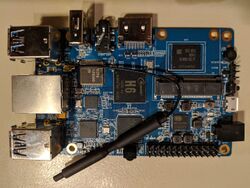Xunlong Orange Pi 3
| Xunlong Orange Pi 3 | |
|---|---|
 | |
| Manufacturer | OrangePi |
| Dimensions | 90mm x 64mm |
| Release Date | January 2019 |
| Website | Orange Pi 3 Product Page |
| Specifications | |
| SoC | H6 @ 1.8 Ghz |
| DRAM | 1GiB/2GiB LPDDR3 @ 744MHz |
| NAND | 8GB eMMC (optional) |
| Power | DC 5V @ 2A (4.0mm/1.7mm barrel plug - centre positive) |
| Features | |
| Video | HDMI type A full, composite on AV port |
| Audio | 3.5mm headphone plug, HDMI, onboard microphone |
| Network | WiFi 802.11 b/g/n/ac (AP6256), 10/100/1000Mbps Ethernet (Realtek RTL8211E) |
| Storage | µSD, optional soldered eMMC |
| USB | 1 USB2.0 Host, 1 USB2.0 OTG, 4 x USB3.0 host (via hub chip) |
| Other | infrared receiver, PCIe (broken in SoC) |
| Headers | 26 pin GPIO, 3 pin UART |
Identification
The currently sold board has the following text on top: Orange Pi 3 v1.5.
Sunxi support
Current status
The H6 SoC support has matured since its introduction in kernel 4.17. Most of the board functionality for boards such as Orange Pi 3 are available with current mainline kernels. For the missing features see: Linux_mainlining_effort
Manual build
You can build things for yourself by following our Manual build howto and by choosing from the configurations available below.
U-Boot
Sunxi/Legacy U-Boot
- https://github.com/orangepi-xunlong/OrangePiH6_uboot - BSP U-Boot
Mainline U-Boot
Use the orangepi_3_defconfig build target. Available since v2021.04-rc1.
Linux Kernel
Sunxi/Legacy Kernel
- https://github.com/orangepi-xunlong/OrangePiH6_external - FEX/WiFi firmware files
- https://github.com/orangepi-xunlong/OrangePiH6_Linux4_9 - BSP kernel
Config name is OrangePiH6_3_defconfig
Mainline kernel
Use the sun50i-h6-orangepi-3.dts device-tree binary (available since kernel 5.2).
Mainline Linux kernel device tree file for this board is being prepared in this Linux tree:
The tree currently contains additional patches for the Ethernet.
- This branch contains support for thermal sensor, DVFS and thermal regulation:
https://megous.com/git/linux/log/?h=ths-5.11
Firmware files
For WiFi, you'll need a fw_bcm43456c5_ag.bin firmware file and nvram.txt configuration that can be found in the Xulongs's repository for H6:
Mainline brcmfmac driver expects the firmware and nvram at the following paths relative to the firmware directory:
- brcm/brcmfmac43456-sdio.bin
- brcm/brcmfmac43456-sdio.txt
For Bluetooth 5.0, you'll need a BCM4345C5.hcd firmware file that can be found in the Xulongs's repository for H6:
The driver expects the firmware at the following path relative to the firmware directory:
- brcm/BCM4345C5.hcd
Tips, Tricks, Caveats
- USB power rails are directly connected to the 5V input power, including on the micro USB connector (you'll have trouble powering the board from the DC jack, and using the microUSB port to connect the board to a PC at the same time). The board can be powered via DC input or via microUSB with a PSU like an Aukru 5V 3A; powering from an USB 3 port should work but is untested.
- The schematic specifies a total current limit of 1.5A per the double USB 3.0 connector.
- The schematic shows optional polyfuse circuit to limit the USB current, but there's no polyfuse on the v1.5 of the board.
- UBoot does not support PMIC that's used on the board, and doesn't turn off ethernet PHY regulators after reboot, which may lead to PHY initialization failures during reboot in some configurations.
- Ethernet might not work with current versions and their combinations of UBoot, ATF (arm-trusted-firmware) and Linux. ATF needs to be built with SUNXI_SETUP_REGULATORS=0 passed or built from a version not yet having any support for setting up respective regulator(s) (e.g. "v2.2").
FEL mode
- If you try this, beware of the direct connection between microUSB VBUS and DCIN.
Using serial port
Like with other Orange Pi boards, UART uses 3.3V signalling and is 5V tolerant so you can use any of the usual USB-UART dongles. UART pin header is easily accessible.
Locating the UART
UART is located between the mic and the power on key. Pin order: GND-RX-TX. GND is marked by a white arrow.
Pictures
See also
- AXP805 Datasheet: File:AXP805 Datasheet V1.0 en.pdf
- H6 Datasheet: File:Allwinner H6 V200 Datasheet V1.1.pdf
- H6 User Manual: File:Allwinner H6 V200 User Manual V1.1.pdf
- Schematics 1.5: File:OrangePi 3 Schematics v1.5.pdf
Manufacturer images
Optional. Add non-sunxi images in this section.


